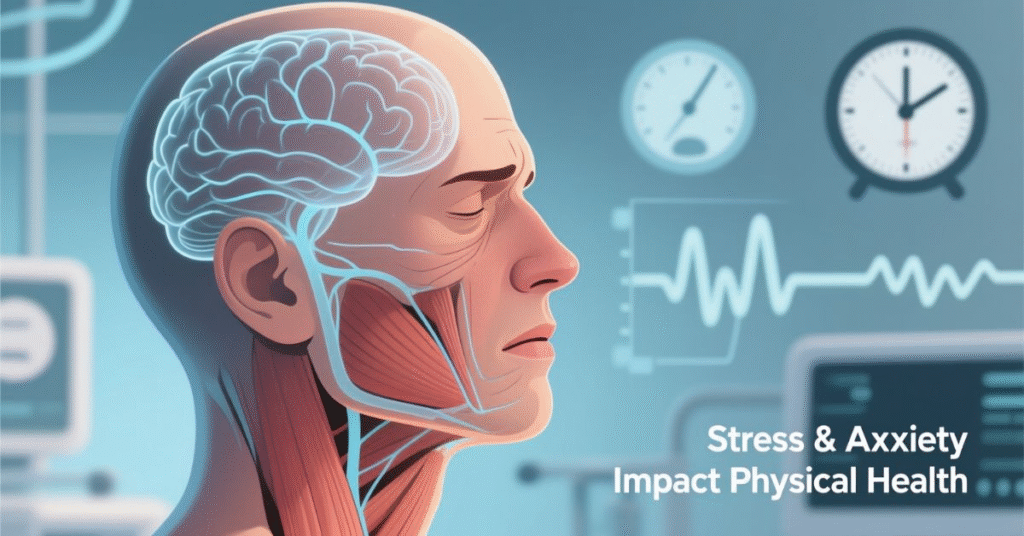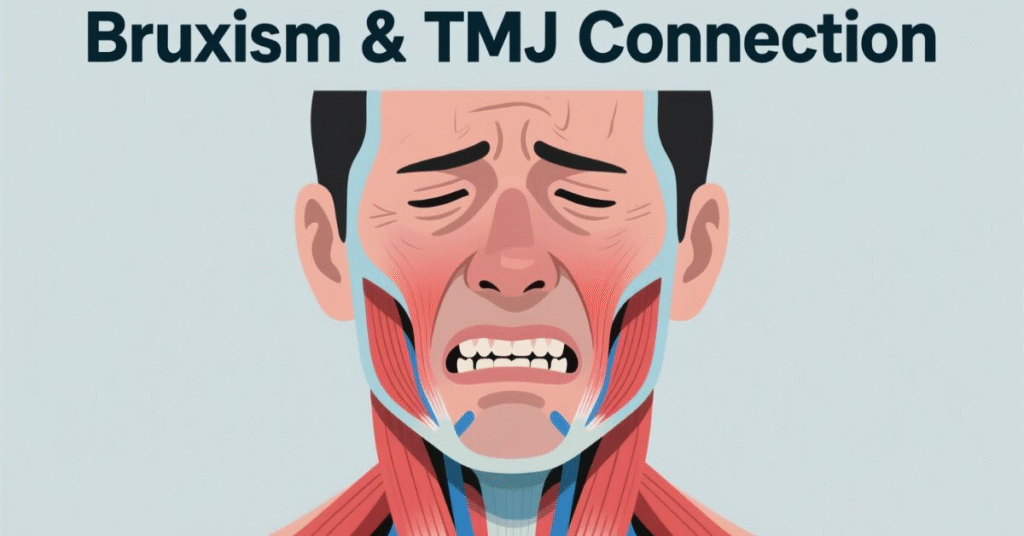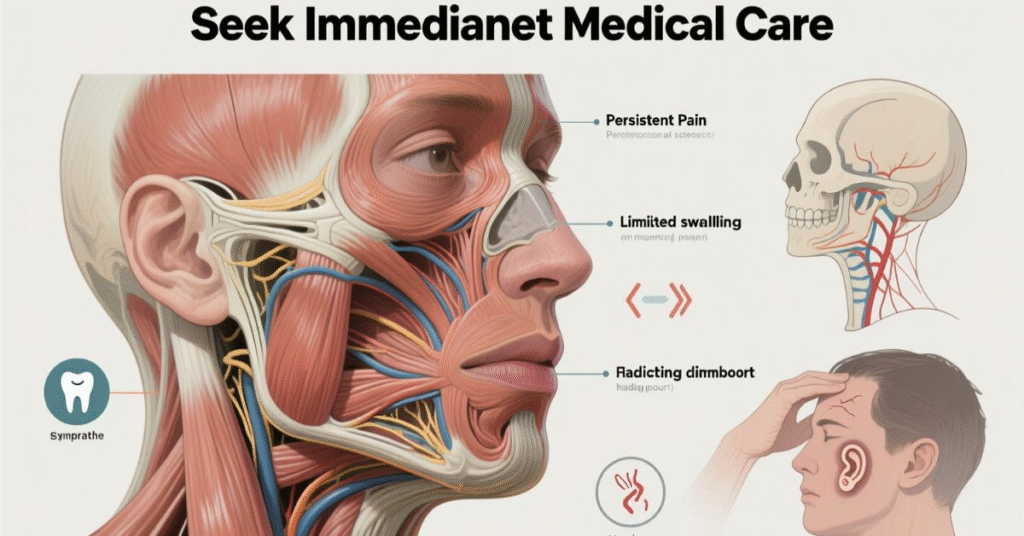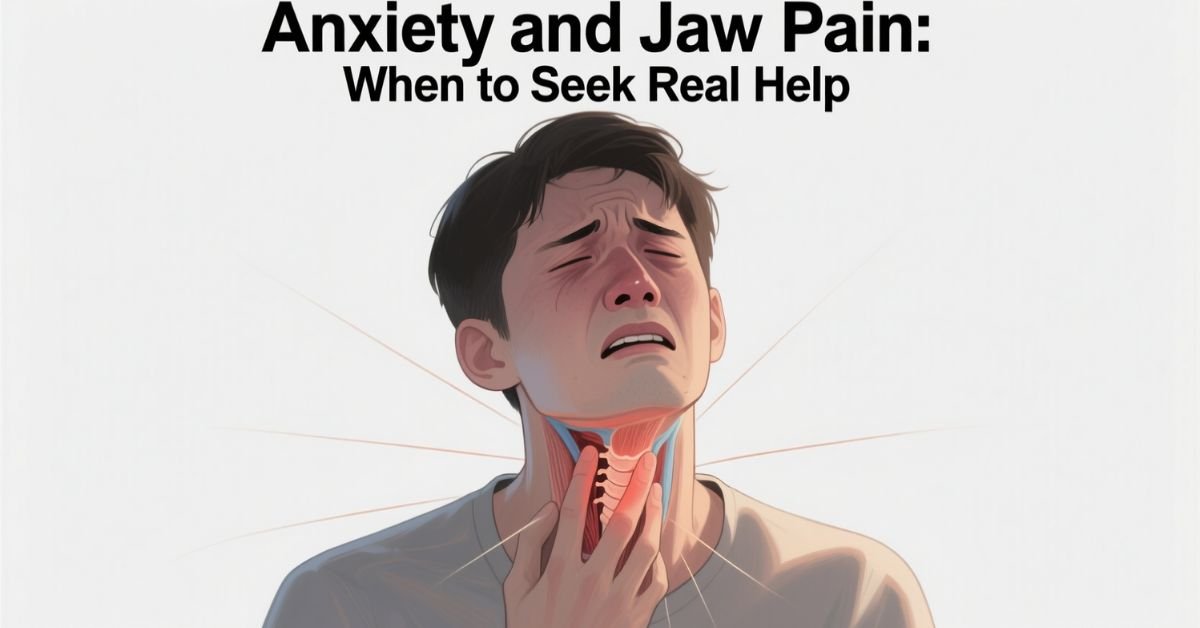Introduction
Anxiety is more than just worry. It affects the body in surprising ways, including the jaw. Jaw pain can come from clenching, grinding, or constant muscle tension caused by stress and anxiety.
Have you ever noticed your jaw hurting after a stressful day? Or waking up with a tightening in your face? Many people don’t realize the connection between anxiety and jaw pain until it becomes hard to ignore.
Jaw pain linked to anxiety is common but often overlooked.It can cause headaches, sleep problems, and even long-term dental issues. Knowing when to get help is the key to finding relief and protecting your health.
The Link Between Stress, Anxiety, and Jaw Pain

Stress and anxiety affect more than just your thoughts. They can also create real physical problems in the body. One of the most common issues is jaw pain. When you feel tense, you may clench or grind your teeth without even realizing it. Over time, this constant pressure causes sore muscles, headaches, and discomfort in the jaw.
The connection between anxiety and jaw pain is stronger than most people think. It is not only a dental issue but also an emotional one. Stress sends signals through the body that tighten muscles, especially around the jaw. This can lead to pain, stiffness, and even problems with sleep. By understanding how anxiety and jaw pain are linked, you can take steps to reduce tension and protect your overall health.
What Causes Jaw Pain and Discomfort?
Jaw pain can happen for many reasons.The most common cause of clenching or grinding teeth is stress or anxiety.As a result, the jaw muscles and joints are put under extra pressure. Dental problems, such as cavities or gum infections, can also create discomfort in the jaw area. Sometimes, pain spreads from ear or sinus issues and feels like it comes from the jaw.
Another cause is temporomandibular joint disorder (TMJ).If the joint that connects the jaw to the skull does not function smoothly, it can lead to this problem. TMJ can lead to clicking sounds, stiffness, and sharp pain. Poor posture, injuries, or even chewing gum too often can add more strain. Identifying jaw pain and discomfort’s possible causes is the first step toward finding a treatment that works.
Signs That Stress Is Causing Jaw Dysfunction
Stress can show up in the body in many ways, and the jaw is one of the most common areas affected. When stress builds up, you may start to clench or grind your teeth without noticing. It is possible for constant pressure to cause jaw joint pain and stiffness. Over time, it may even affect how your jaw moves and works.
Some clear signs of stress-related jaw dysfunction include:
- Frequent jaw pain or soreness
- Clicking or popping sounds when opening the mouth
- Headaches or earaches without another clear cause
- Difficulty chewing or speaking comfortably
- Tightness in the jaw, face, or neck muscles
Symptoms of Jaw Tension and Anxiety
Jaw tension is a common problem for people dealing with stress. When the body feels anxious, the muscles tighten, and the jaw often holds that pressure. Over time, this leads to pain, stiffness, and difficulty with normal movements like chewing or speaking. Many people with anxiety and jaw pain don’t notice the problem until it becomes severe.
The symptoms can show up in both physical and emotional ways. It is common for them to start small, but if not treated, they may grow worse. Below is a table that highlights common signs of jaw tension and anxiety:
| Jaw Symptoms | Anxiety Symptoms |
| Jaw pain or soreness | Restlessness |
| Clicking or popping in the jaw | Racing thoughts |
| Stiffness when opening the mouth | Trouble sleeping |
| Grinding or clenching teeth | Rapid heartbeat |
| Headaches from jaw tension | Sweating or shaking |
| Earaches or pressure near the jaw | Constant worry or fear |
| Difficulty chewing comfortably | Feeling tense or on edge |
How Anxiety Leads to Jaw Clenching (Bruxism & TMJ Connection)

Anxiety often keeps the body in a state of stress. This constant tension makes the jaw muscles tighten, sometimes without you even noticing. Many people grind or clench their teeth during stressful times, a habit known as bruxism. It can happen during the day or while sleeping, and it is one of the most common links between anxiety and jaw pain.
Over time, bruxism puts heavy pressure on the temporomandibular joint (TMJ), which controls jaw movement. This pressure leads to stiffness, clicking sounds, and discomfort while chewing or speaking. If ignored, it can make anxiety and jaw pain worse, creating a cycle that affects both mental and physical health. Learning to manage stress and reduce clenching is important for protecting your teeth, jaw, and overall well-being.
Complications of Untreated Jaw Tension
When anxiety and jaw pain are ignored, small issues can turn into big problems. Ongoing tension may cause sharp jaw pain, ear aches, and constant headaches. Many people with anxiety and jaw pain also struggle with sleep, as tight muscles can make it hard to rest. Over time, this stress affects daily life and comfort.
Untreated anxiety and jaw pain may also damage oral health.The act of clenching and grinding can damage teeth, wear down enamel, and strain the jaw joint. If anxiety and jaw pain continue without care, it can lead to long-term problems that are harder to manage. Seeking help early makes recovery easier and prevents lasting damage.
Exercises to Relieve Jaw Tension
Jaw tension can feel heavy and painful. Gentle exercises help relax tight muscles. They are easy to do at home and take only a few minutes. With regular practice, these moves can reduce stress and improve comfort.
Some simple exercises include:
- Slowly open and close your mouth while keeping it relaxed.
- Place your tongue gently against the roof of your mouth, then breathe in and out deeply.
- Massage the jaw muscles in small circles with your fingers.
- Stretch your neck side to side to ease pressure.
Treating and Preventing Jaw Tension from Anxiety
Jaw tension from anxiety can be treated with simple steps. Relaxation, gentle exercises, and stress control often bring relief. If pain continues, a doctor or dentist may suggest mouth guards, therapy, or medication. Getting help early prevents long-term damage.
Preventing future tension is just as important. Building daily habits lowers stress on the jaw. Small lifestyle changes, along with healthy routines, can protect both your mind and body.
Table: Ways to Treat and Prevent Jaw Tension from Anxiety
| Method | How It Helps | Simple Example You Can Try |
| Jaw exercises | Loosen tight muscles | Open and close mouth slowly |
| Massage | Reduces stiffness and pain | Rub jaw in small circles |
| Deep breathing | Calms stress and anxiety | Inhale 4s, exhale 6s |
| Heat or cold packs | Relieves soreness and swelling | Warm towel or ice pack use |
| Mouth guards | Protects teeth from grinding | Wear at night if needed |
| Good posture | Prevents extra strain on jaw muscles | Sit upright, relax shoulders |
| Stress management | Lowers anxiety that causes tension | Meditation or journaling |
| Healthy sleep routine | Restores muscles and reduces stress | 7–8 hours of sleep daily |
| Limit caffeine | Prevents added muscle tension | Reduce coffee and soda |
| Professional care | Provides long-term treatment plans | Dentist or therapist visit |
When to Contact a Doctor for Jaw Pain

Jaw pain is common, but it should not be ignored. If the pain is constant, severe, or gets worse with time, it is best to see a doctor. Sudden swelling, trouble opening your mouth, or pain while chewing are also warning signs.
You should contact a doctor if jaw pain comes with anxiety, headaches, or ear problems. Medical care can rule out serious issues and prevent long-term damage. Getting help early makes treatment easier and brings faster relief.
Key Takeaways & Summary
Anxiety and jaw pain are closely linked. Stress can cause muscle tension, clenching, and grinding that lead to discomfort. Simple exercises, stress control, and healthy routines can bring relief.
Ignoring the pain can lead to bigger problems. Seeking help early protects your teeth, joints, and overall health. With the right care, anxiety and jaw pain can be managed and reduced.
Conclusion
Jaw pain and anxiety are often connected. Stress can build up in the body and show in the jaw. Simple care and awareness can ease the pain and bring comfort.
Do not ignore the signs. Small changes, daily habits, and timely medical help can make a big difference. With the right steps, both anxiety and jaw pain can be managed for a healthier life.
FAQs
1. Can anxiety really cause jaw pain?
Yes, anxiety can lead to jaw pain through muscle tension, clenching, or grinding.
2. How can I tell if my jaw pain is from anxiety?
If the pain worsens during stress or worry, anxiety may be the cause.
3. What helps relieve anxiety and jaw pain at home?
Gentle jaw stretches, relaxation, massage, and stress management may bring relief.
4. When should I see a doctor for jaw pain?
If the pain is constant, severe, or affects daily life, seek medical advice.
5. Can jaw pain from anxiety go away on its own?
Sometimes it eases with stress relief, but lasting or severe pain needs treatment.

